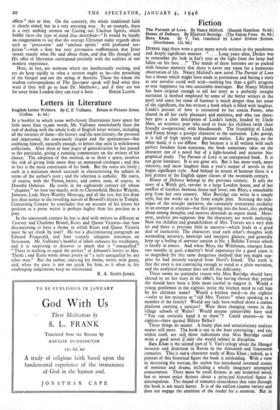Letters in Literature
English Letter Writers. By C. E. Vulliamy Britain in Pictures Series. (Collins. is. 6d.) English Letter Writers. By C. E. Vulliamy Britain in Pictures Series. (Collins. is. 6d.)
IN a booklet in which some well-chosen illustrations leave space for little more than is000 words, Mr. Vulliamy nonchalantly faces the task of dealing with the whole body of English letter writers, including all the varieties of them—the literary and the non-literary, the personal and impersonal, the consciously elegant and the spontaneous—but confining himself, naturally enough, to letters that exist in well-known collections. After three or four pages of generalisation he has passed to the particular, giving a running commentary on the writers of his choice. The adoption of this method, in so short a space, involves the risk of giving little more than an annotated catalogue ; and this in fact is the main constituent of his book. But the notes are lively ; each in a miniature sketch succeeds in characterising the subject in terms of the author's taste ; and the selection is catholic. He starts, of course, with the Paston„ letters, and comes soon, of course, to Dorothy Osborne. He revels in the eighteenth century (of whose " elegance " we hear too much), with its Chesterfield, Horace Walpole, Johnson, Lady Mary Wortley Montagu, and all the rest, but has done less than justice to the revealing naiveté of Boswell's letters to Temple. Concerning Cowper he concludes that on account of his letters his position as a prose writer is perhaps higher than his position as pot
In the nineteenth century he has to deal with waiters so different as Creevey and Charlotte Brontë, Keats and Queen Victoria—but how disconcerting to have a theme in which Keats and Queen Victoria must be set cheek by jowl! He has a discriminating paragraph on Edward Fitzgerald, and four scarcely adequate sentences on Stevenson. Mr. Vulliamy's bookful of labels exhausts his vocabulary, and it is surprising to discover so much that is " unequalled." " There is nothing to equal the pathos " of Johnson's letters to Mrs. Thrale ; and Keats wrote about poetry in " a style unequalled by any other man." But the author, enjoying his theme, writes with gusto, and, when the pace is not too quick for him, as it often is, his challenging judgements keep us entertained.
R. A. SCOTT-JAMES.































 Previous page
Previous page